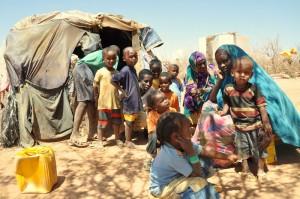Somalia famine caused by political failure

The UN has officially declared a famine in two regions of southern Somalia today.
Governments around the world have collectively failed to act to prevent the famine in Somalia, Oxfam Ireland Chief Executive Jim Clarken has said.
“The crisis has been building for several months but the response from international donors and regional governments has been mostly slow and inadequate and the aid response is still $800m short of what is needed,” he added.
He was speaking from Dadaab refugee camp in Kenya, where he is part of a consortium of Irish aid agencies visiting the drought-stricken region with former Irish President and President of Oxfam International, Mary Robinson.
East African nations including Somalia, Ethiopia and Kenya are experiencing the worst drought in 60 years. The failure of crops and conflict between al-Qaeda-inspired al-Shabaab insurgents has forced almost 800,000 refugees to flee Somalia to neighbouring countries.
“An exodus of 3,500 people a day are fleeing Somalia and arriving in parts of Ethiopia and Kenya that are suffering one of the driest years in six decades. Food, water and emergency aid are desperately needed,”Clarken said. “We have seen some harrowing scenes this week of people in desperate need. By the time the UN calls it a famine it is already a signal of large scale loss of life. We must now ensure that aid comes quickly to prevent people dying in massive numbers,” he said.
The Food Security and Nutrition Analysis Unit (FSNAU) based in Somalia has said that this crisis represents “the most serious food insecurity situation in the world today, in terms of both scale and severity.” They have also said that the current humanitarian response is “inadequate” to meet emergency needs. According to the FSNAU “famine across all regions” of southern Somalia “will occur in the coming 1-2 months”.
Clarken said that the UN announcement of famine in Somalia comes at a time when such famine has been eradicated everywhere else in Africa. He called this both a “wake-up call to the scale of this disaster” and a “wake-up call to the short and long-term solutions needed to limit death from hunger now and to stop it for good in Africa in the future.”
“People are vulnerable to starvation when there is crop failure and chronic poverty, but famine only happens when there is an underlying political failure by governments. This famine represents a triple failure of food production, people’s ability to access food and the political response to the unfolding crisis,” he said.
In order to ensure a long term solution, the political problems in the region need to be addressed, Clarken said. “Once this famine is dealt with we need to ask why it’s happened again, and, more importantly, how can we prevent the next one?”
Across the country, nearly half of the Somali population – 3.7 million people – are now in crisis. Oxfam Ireland has launched an emergency appeal for East Africa, and they are currently providing water for nearly 200,000 people along with sanitation, health education and emergency food for malnourished children.
Image Top: Oxfam Ireland
